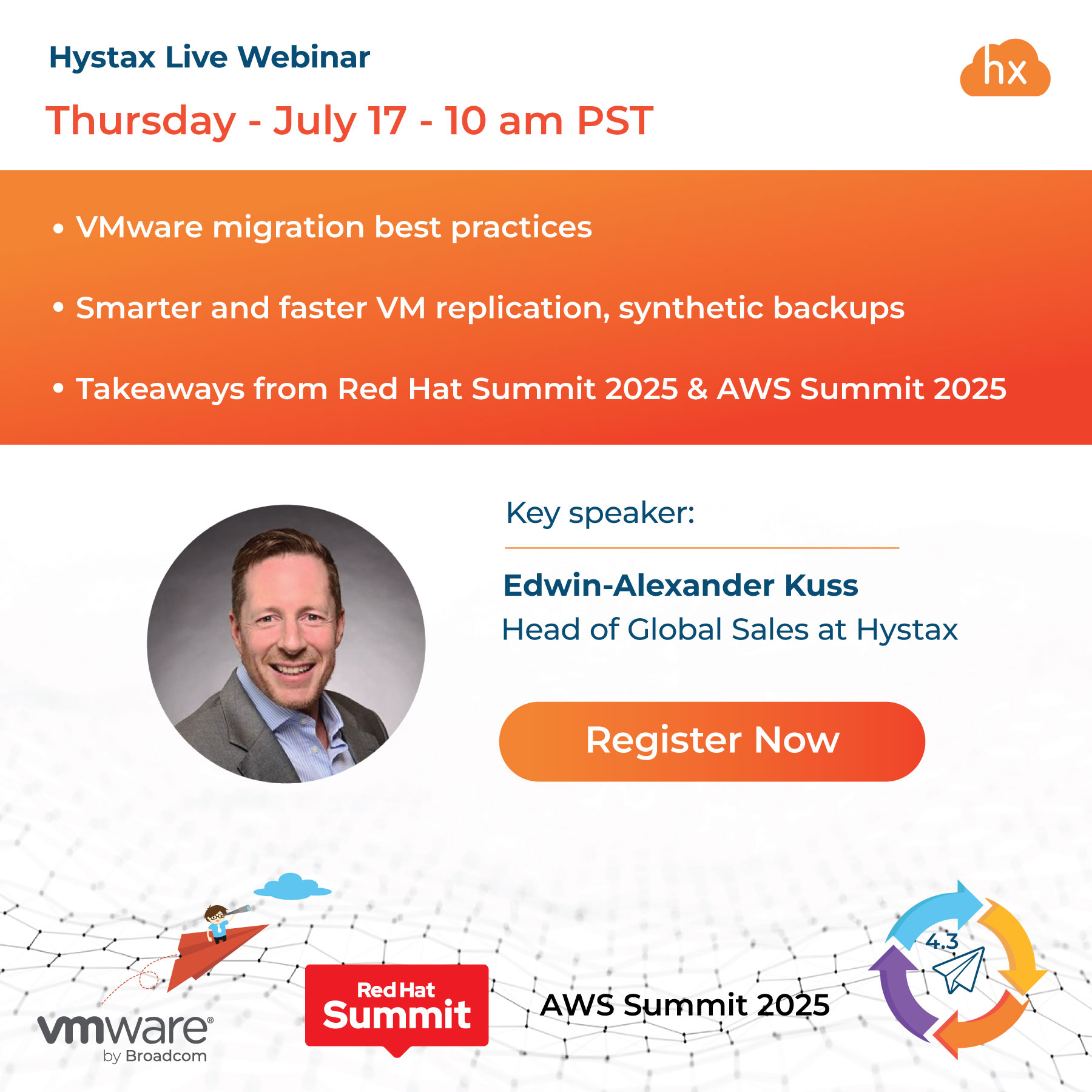OptScale is an open-source platform that manages and optimizes cloud infrastructure costs and workload performance. It is specifically tailored for financial (FinOps) and machine learning operations (MLOps). It helps businesses monitor and control their cloud expenditures, ensuring efficient resource usage across various cloud environments like AWS, MS Azure, Google Cloud, and Alibaba Cloud.
One significant aspect that OptScale addresses in managing cloud resources is detecting and managing unused volumes. Unused volumes in cloud storage can contribute significantly to unnecessary costs. OptScale provides mechanisms to identify unused resources, including storage volumes, virtual machines, and snapshots that are no longer attached to any active instances or necessary for current operations. Businesses can reduce their overall cloud expenditure by cleaning up these unused resources.
OptScale also emphasizes best practices for cloud cost optimization, which includes regular monitoring and decommissioning of unused resources, re-flavoring VMs based on performance needs, and employing cost-saving models like reserved instances and spot instances.
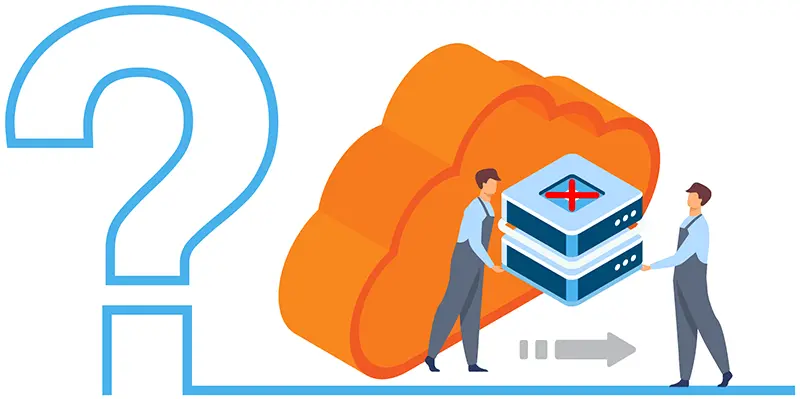
How OptScale helps detect and remove unused volumes and snapshots
Managing unused storage volumes is an essential aspect of cloud resource management that can help organizations optimize costs and efficiency. OptScale supports various cloud providers, including AWS, Azure, Alibaba Cloud, GCP, and Nebius. The platform offers tools for identifying unused volumes and obsolete snapshots and gives recommendations for resources not being utilized effectively.
These unused or ‘orphaned’ volumes can linger in your account without serving any operational purpose, leading to unnecessary costs.
Keeping unused volumes can lead to wasteful expenditures, which accrue even if the volumes are not actively used. Use OptScale to identify unused volumes and snapshots. The OptScale solution looks for volumes with an ‘available’ status, which indicates they are not attached to any instance. It allows you to detach and delete volumes based on the report you’ve got. In addition to the report, a script is generated that deletes unused volumes and snapshots.
It’s a good practice to review and audit your resources regularly. Implementing tagging strategies and lifecycle policies can help manage resources effectively and avoid unnecessary costs. Periodically auditing and cleaning up unused volumes and snapshots can lead to significant cost savings and more efficient resource management in your AWS environment.
Please note that before deleting unused volumes, you should consider taking snapshots for backup purposes. Snapshots allow you to restore data later if needed.
In this case, we aim to find detached volumes for more than one day.
The OptScale solution also has automated scripts for cleaning up unused volumes or obsolete snapshots to help users reduce costs.
These features can help you manage storage costs and ensure that you only pay for the resources you use.
How to find unused volumes and snapshots in OptScale
To get tangible recommendations from OptScale, go to the ‘Not attached Volumes’ or ‘Obsolete Snapshots’ card on the ‘Recommendations’ page.
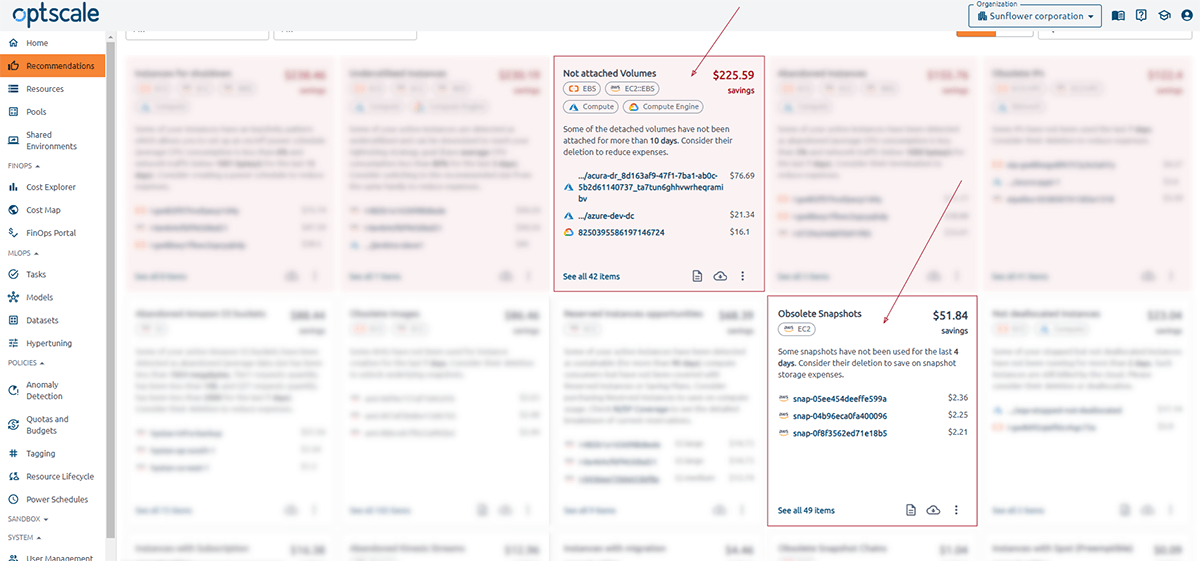
The OptScale solution considers a volume unused if it has not been attached to any instance for the last day.
EBS snapshot is as obsolete if:
- its source EBS volume does not exist anymore
- there are no AMIs created from this EBS snapshot
- it has not been used for volume creation for the last three days
The number of days is configurable in both cases, so change it to fit your needs.
To get a detailed comprehension of the OptScale recommendation cards’ utilization, follow the link
How to use the 'See all items' page
Follow the link ‘See all items’ at the bottom of the card to view the saving opportunities with minimal commitment and savings with average commitment for each item. Active, dismissed, and excluded items are separated into tabs.
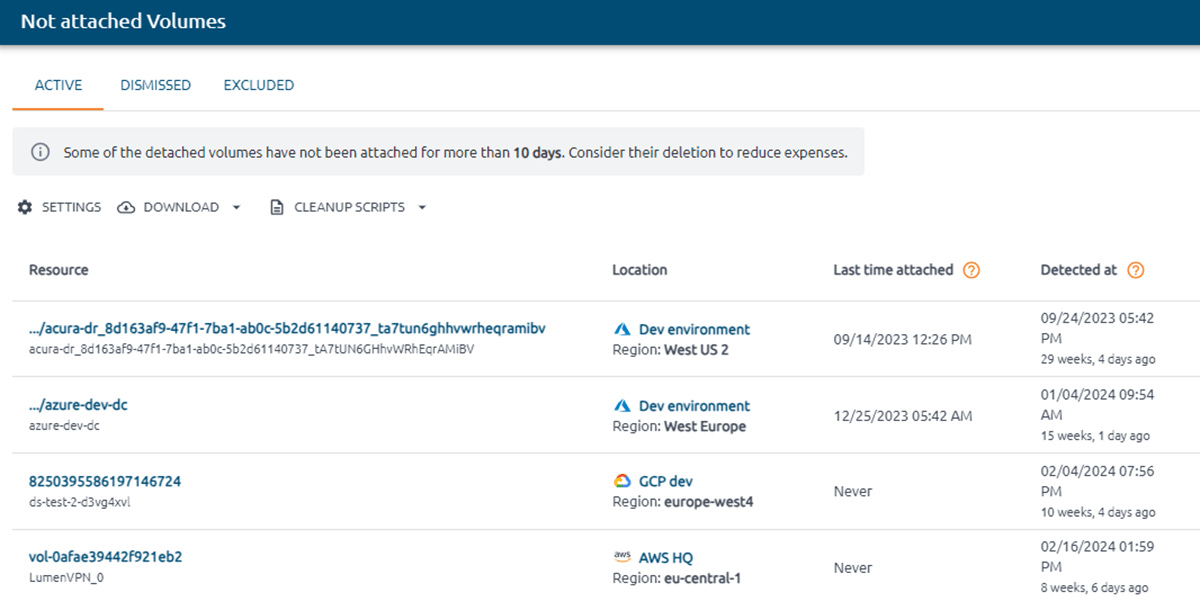
The resources table contains Location, Last time attached, Detached at, Expenses when detached, Possible monthly savings information for each item, and an actions menu. Click any item to go to the resource description page.
A group menu is available for a list of items.
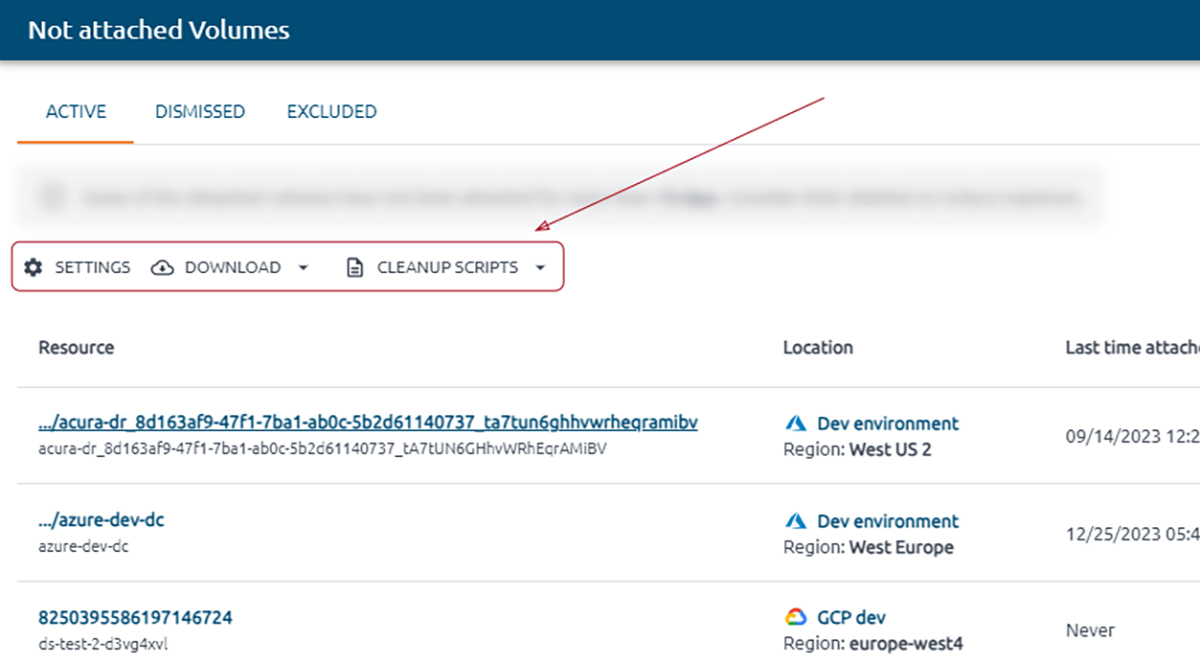
Use ‘Settings’ to set the days when the volume is marked as unused or a snapshot is considered obsolete.
When you’ Download’ a table, select the XLSX spreadsheet or JSON file format. The table provides comprehensive information about the listed items.
Select a data source you want to clean before downloading cleanup scripts:
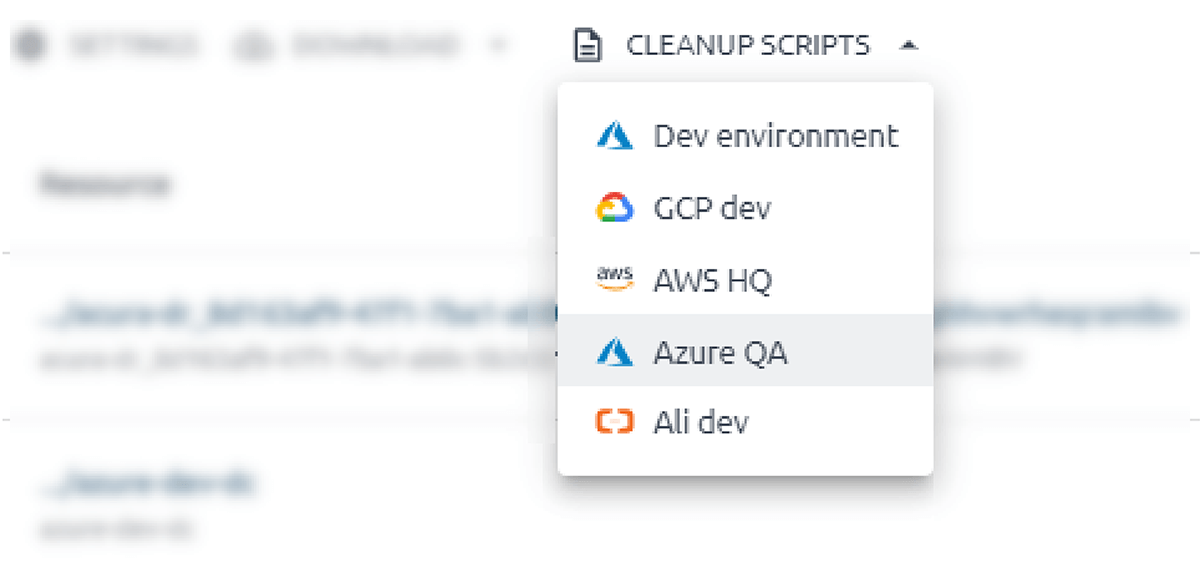
Free cloud cost optimization. Lifetime
How to get a cleanup script for a data source
There are two ways to download a cleanup script for a specified data source. This feature is available on the Recommendations card and the ‘See all items’ side modal.
Recommendation card:
Click on the button at the bottom of the card.
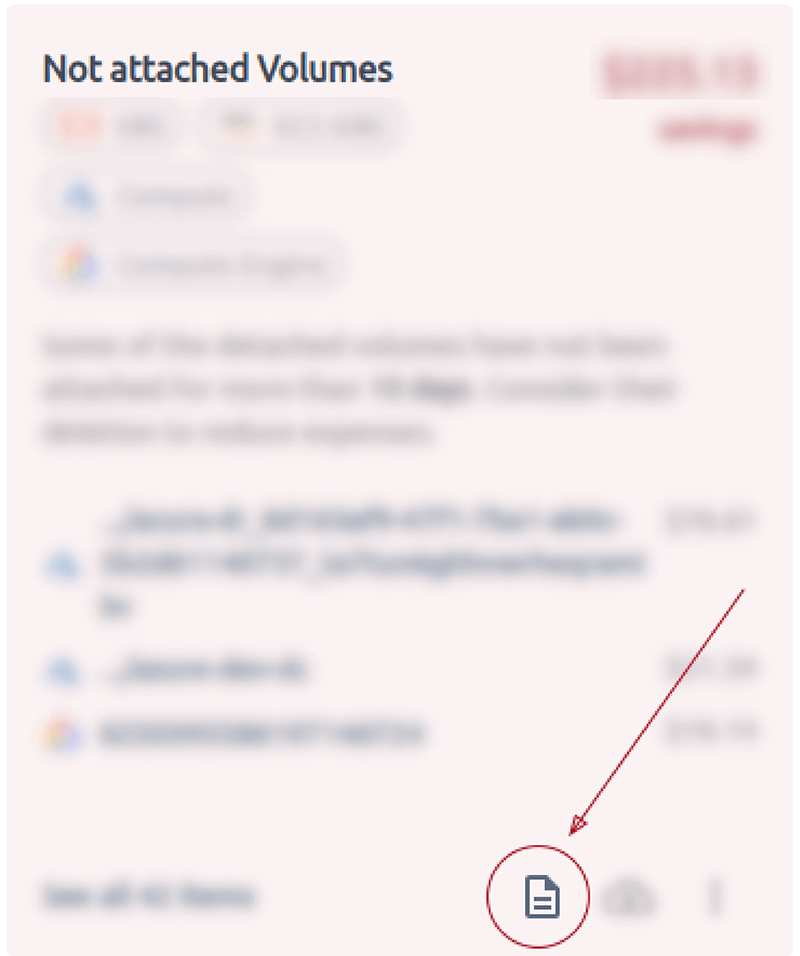

Select a data source. An .sh file will be downloaded automatically.

‘Not attached Volumes’ or ‘Obsolete Snapshots’ side modal.
In the ‘Not attached Volumes’ or ‘Obsolete Snapshots’ side modal, click on the data source in the ‘Cleanup scripts’ menu.
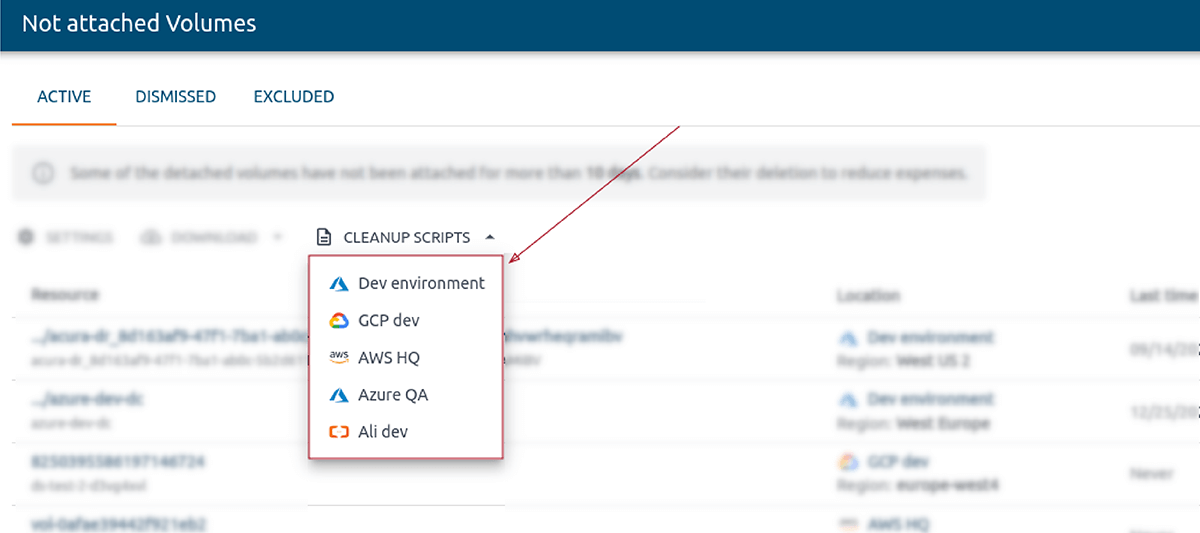
An .sh file will be downloaded automatically.
How to start a cleanup script on AWS
To start a cleanup script on AWS, first ensure that the latest version of AWS CLI is installed or update an existing version to the latest. Find detailed instructions here.
Second, ensure that the jq package (a tool for parsing JSON on the bash command line) is installed.
When all the requirements are installed, all you need to do is configure the AWS CLI (detailed information can be found here) and start the script via the command:
run script bash <script_name> <path to recommendation json file>
How to start a cleanup script on Microsoft Azure
To start a cleanup script on Azure, first make sure that the latest version of Azure CLI is installed, or update an existing version to the latest. Find detailed instructions here.
Second, ensure that the jq package (a tool for parsing JSON on the bash command line) is installed.
When all the requirements are installed, all you need to do is just sign in to Azure CLI and start the script via the command:
run script bash <script_name> <path to recommendation json file>
Another option is to run the script using Azure shell. To do this open MS Azure shell and run the script:
run script bash <script_name> <path to recommendation json file>
Use absolute paths or perform cd before execution.
How to start a cleanup script on Alibaba
To start a cleanup script on Alibaba, first, ensure that the latest version of Alibaba CLI is installed or update an existing version to the latest.
Second, ensure that the jq package (a package to parse JSON on bash) is installed.
When all the requirements are installed, start the script via the command:
run script bash <script_name> <path to recommendation json file>
Another option is to run the script using Alibaba shell. To do this, open Alibaba shell and run the script:
run script bash <script_name> <path to recommendation json file>
Our OptScale team emphasizes the importance of effective resource management, providing automatic and manual tools to help users handle unused volumes efficiently and optimizing costs and resource usage.
Additionally, OptScale’s capabilities extend to supporting MLOps by providing tools for ML model training, tracking experiments, and optimizing the performance and costs of ML workloads. This includes detailed profiling of machine learning models and experiments, which helps identify and mitigate performance bottlenecks and unnecessary expenses.
OptScale is a comprehensive tool for organizations looking to enhance their cloud and ML operations through effective cost management and resource optimization.
We’d appreciate it if you would give us a Star.



